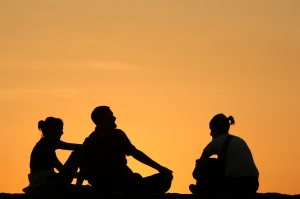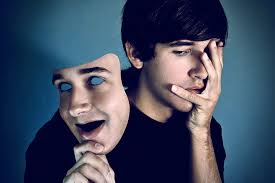
Guinness World Records largest human rainbow held in Philippines from Polytechnic University – Source: noypicollections.blogspot.com
I am a queer, Filipina womyn of color. I was born and raised 17 years of my life in the Philippines and migrated to the United States in 1999. During my college years in 2002, I realized I was attracted to womyn and identified as a lesbian. Having the language, such as the word lesbian enabled me to talk and explore my sexuality and humanity.
In my time, the Filipino culture at large considers being LGBTQ or homosexual a taboo and was not talked about, and religiously considered a SIN. At the same time, we are also accepting of the Gay (men) community such as gay men fixing our hair and beauty or butt of the joke. There is also the notion of, “If it’s not in my family then it’s okay.” The Philippines was colonized by Spain from 1521-1898 that lead to the introduction of Catholicism. I too was Catholic and I had to denounce my religion because it doesn’t match with my values and have done harm to my humanity and relationships.
I realized that to fully embrace my sexuality, I had to prepare myself to accept that I will lose my family, my Filipino community, and my religion in the limbo. I was out, proud and did not care what I had to lose. Those who care will be there from the start or join you when they’ve grown up spiritually and realize they’ve pushed you out for ignorant reasons.

Further critically reflecting and exploring my sexuality, I have realized that this attraction started when I was in sixth grade. Ms. U was my English teacher and I always sought her attention. I was happy to see her and I volunteered with whatever she needed help with. I had a huge crush on her. Then my sophomore year, I felt the same way with my neighbor that was seven years older than me. Besides the physical attraction I was attracted to her fierceness as a womyn. A womyn with her own car, professional image, serious attitude and stature, and not caring of what people think about her. That was admirable to me and I was just happy and content to look at her from a far. Junior year, I attended a martial arts club called PHICKAJU (Philippine Combat Karate Judo) and there was a senior student that was so talented with her martial arts skills. It was the same feelings and attractions. No sexual thoughts involved, just being around the presence of these womyn made me happy and tugging at the strings of my heart. Through these past years, learning about my sexuality lead to the realizations of my humanity and these previous experiences and emotions towards womyn.
In 2002, my sister ousted me to my mother that was still in the Philippines. She added additional versions and stories that were not true. Stuff that enraged my mother to not accept me. At that time, I didn’t have the chance to tell her my story, my truth… my very personal experience and dignity that no one else have the right to tell. In 2009, I welcomed my mom to live with me and I was able to tell her my side of the story. She told me that, “No matter what you’re still my daughter.” Four of my siblings are accepting of me, one of my brother even told me that, “I already knew you were a long time ago.” I chuckled and jokingly said, “You mean I’m the only one who did not know I was gay?,” but this was with an all honest statement.
In 2008, I joined the Military to see the world and for it’s benefits and opportunities, but now I’m in a process of understanding this experience, politics and my role. At that time, Don’t Ask Don’t Tell Policy (DADT) was alive and was the suffocation on what’s left of our, my human emotions and rights. Being in the military, you sign up your being, mind, body and transform yourself to act and be the defense and offense for government, nation and people. Regardless how much I embraced my lesbian sexuality, I felt that I had no choice but to go back into the closet because of my fear of the “what ifs”? What if I lose my job, benefits, home, citizenship, what if I can no longer take care of my family, and what if I can’t get a job elsewhere if I got reported and discharged with dishonor?” With this policy, very few selected people knew of my sexuality, because I didn’t feel safe and limited my friendships within military and my environment in San Antonio; which was made up with large military bases. Then in 2011, DADT was repealed after all the hardwork of ex-military members, family, friends, activists, and some politicians. DADT has been an oppressive policy led by homophobic, religious conservatives and their dehumanizing agenda. This has caused me struggles and barriers to find acceptance of who I am by being Out as a civilian then as an active duty service member, having to silence my dignity and go back into the closet for three years. I thought a lot about what freedom meant, because the values of protecting and serving the US are based on freedom, but I still did not feel free. I saw my family and friends who are LGBTQ, not free from from violence and discrimination, especially if they were Asian and from Communities of Color and Indigenous people. They suffered more harshly due to institutionalized homophobia, transphobia, classism and racism. A part of me was still in the closet, traumatized with the situation, and constantly battling with myself on how I should act and be. These type of violent policies does an excellent job of making us and our community police each other and how we, specifically how I should act and feel as a person. I definitely couldn’t show simple acts of affection or introduction of my partner of 3 years to anyone.

2012 Twin Cities Pride March
The 2012 election was the very first time I voted, and my first time marching in Minnesota’s lesbian, gay, bisexual, transgender and queer pride parade. Being our Commander in Chief is President Obama, I felt so liberated and powerful holding a sign that said, “Obama Pride, LGBT for Obama.”
I learned that VISIBILITY is key, and when more people empathize with our stories, experiences and struggles, more people will understand us and shift away from oppressive and conservative belief and policy.
Having to constantly come Out, constantly struggle internally and externally, constantly learning, constantly embracing the self, constantly critical thinking, constantly advocating, constantly staying involved in activism and community, constantly being informed and educating. These are some of the “CONSISTENCY” that I go through being a queer, Filipina womyn of color.

2015 – Marching in solidarity with Baltimore in Minneapolis Rise Up and Shut It Down.
Maica is a veteran of the United States Air Force and a new MN resident. She is a full-time student studying Biomedical Engineering and transitioning from a military into civilian life. She is also rooting herself into the world of activism and social justice.
Celebrate May Asian American and Pacific Islander Heritage Month by contributing your narrative to be part of AAPI Midwest Narrative Series. If you identify as AAPI in the Midwest and want to contribute your narrative or have questions, please email Linda for more information – linda@mwsmovement.com

 James Her is from Sacramento, California. He is the first in his family to obtain a professional degree. He received his undergraduate degree in 2014 from Humboldt State University in Sociology, and Criminology and Justice Studies. Currently he is a Master of Social Work (MSW) candidate at the University of Washington. He is in the process of completing his master’s thesis on Mental Health Within the Hmong American LGBTQ Community. He is currently interning at Asian Referral Counseling Services (ACRS) as a behavioral health therapist. He is also a research assistant for the Indigenous Wellness Research Institute (IWRI) and an active member of South East Asian Education Coalition (SEAeD). Upon completing his MSW he would like to go into direct practice and hope to pursue his PhD in the near future.
James Her is from Sacramento, California. He is the first in his family to obtain a professional degree. He received his undergraduate degree in 2014 from Humboldt State University in Sociology, and Criminology and Justice Studies. Currently he is a Master of Social Work (MSW) candidate at the University of Washington. He is in the process of completing his master’s thesis on Mental Health Within the Hmong American LGBTQ Community. He is currently interning at Asian Referral Counseling Services (ACRS) as a behavioral health therapist. He is also a research assistant for the Indigenous Wellness Research Institute (IWRI) and an active member of South East Asian Education Coalition (SEAeD). Upon completing his MSW he would like to go into direct practice and hope to pursue his PhD in the near future.

 Dee is a 26 year old workaholic living in NoCal. An organizer for many causes such as MidWest Solidarity Movement (MWSM), Building Our Future (BOF), Asian Pacific Islander Queer Sacramento (APIQSC), and Sacramento Hmong LGBTQ.
Dee is a 26 year old workaholic living in NoCal. An organizer for many causes such as MidWest Solidarity Movement (MWSM), Building Our Future (BOF), Asian Pacific Islander Queer Sacramento (APIQSC), and Sacramento Hmong LGBTQ.

 Kimora Cha is 26 years old and identify as a Hmong transgender woman from Sacramento, California.
Kimora Cha is 26 years old and identify as a Hmong transgender woman from Sacramento, California. Phiengtavanh is currently living in Ramsey County – employed as the data entry specialist to the Family Health Division of Ramsey County Public Health and working part-time as a Private Charter Screener for G2 Secured Staff. In her spare time, she continues to enjoy time with family and friends while participating in various events with the National Asian Pacific American Women’s Forum. Phiengtavanh is one of the recipients of the Minnesota 25 Veterans’ Voices Award in 2013 for her accomplishment within her community and society.
Phiengtavanh is currently living in Ramsey County – employed as the data entry specialist to the Family Health Division of Ramsey County Public Health and working part-time as a Private Charter Screener for G2 Secured Staff. In her spare time, she continues to enjoy time with family and friends while participating in various events with the National Asian Pacific American Women’s Forum. Phiengtavanh is one of the recipients of the Minnesota 25 Veterans’ Voices Award in 2013 for her accomplishment within her community and society.











